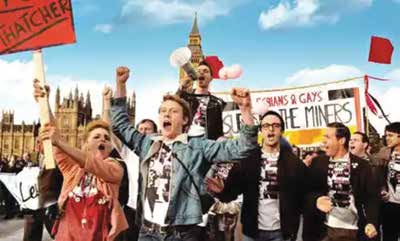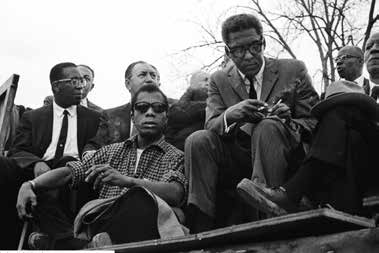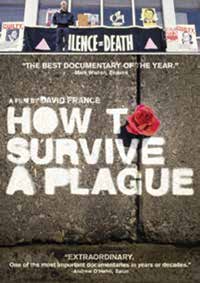
By Gary Kramer–
It’s Pride, yeah! Or, yeah? With COVID-19 canceling the parade, and the unrest in the wake of George Floyd’s death and the stirring activism that followed, what films can we look to for inspiration? Here are four inspiring LGBT options.

Disclosure, (just out on Netfilx), is out trans director Sam Feder’s engaging, affirming documentary that evaluates how transgender characters are presented and consumed by both trans and non-trans viewers. Laverne Cox, Jen Richards, and dozens of other trans actors, filmmakers, and writers discuss representation on screen. Often trans characters were seen as the butt of jokes, or they caused straight (male) characters to vomit (see The Crying Game, or Ace Ventura: Pet Detective). Trans characters were psychopaths (Dressed to Kill, Silence of the Lambs) or playing victims and/or sex workers in ratings-grabbing police and medical shows on TV. Transpeople were also exploited on talk shows where they were meant to educate audiences. Disclosure also addresses the whitewashing of black transpeople (in the 2005 film Stonewall, and the Oscar-winning Boys Don’t Cry). In addition, Feder validates the strides being made, especially on TV with Pose, Chaz Bono’s appearance on Dancing with the Stars, and even Caitlyn Jenner’s reality show that gave positive visibility to accepting parents of trans youth. Disclosure provides a critical awareness about how we are defined by what we watch.

A feel-good film, Pride, from 2014, chronicles the efforts of an LGBT group in 1984 to raise money to support striking Welsh miners. This rousing period drama, based on a true story, shows the power of activism and how the LGBT community found solidarity with—and rallied to support—another oppressed group in Thatcher’s England. Joe (George MacKay) is a closeted 20-year-old student who lives at home. At a gay pride march on June 30, 1984, he is unexpectedly asked by Mike (Joseph Gilgun) to help hold a banner. He soon finds a makeshift family in Mark (Ben Schnetzer), the group’s leader, and Steph (Faye Marsay), the lesbian member, as well as Jonathan (Dominic West), and his lover Gethin (Andrew Scott), a Welsh man. On Mark’s direction, this ragtag group of queer activists creates “Lesbians and Gays Support the Miners” (LGSM). They eventually donate the funds they raise to the Dulais Valley miners, in South Wales. This prompts Dai (Paddy Considine) to pay the LGSM group a visit. While there are members of the community, including Hefina (Imelda Staunton), Cliff (Bill Nighy), and Sian (Jessica Gunning), who appreciate the efforts of the LGSM, Maureen (Lisa Palfrey in a one-note role) is a union leader who strongly objects to the queer group’s support. A battle of wills quickly escalates. Pride shows, in slick, inspirational-movie fashion, how the LGSM educated the miners and their wives, bonding with the very different community. If many of the exchanges in the film play on stereotypes, what is important is that the different groups find common ground against a shared enemy. The lessons of unity are heartfelt, and while they may be preachy, they go down smoothly. Viewers may find themselves fighting back tears during some of Pride, which gets increasingly more emotional as it marches to its climactic gay pride parade. When a Welsh man comes out to one of his colleagues (who suspected he was queer all along), or an LGSM member stands up to prejudice, it is extremely moving. Although the film is quite sentimental, and there are few dramatic surprises—Maureen will fight unfairly to exclude the LGSM and its supporters; a queer character will be gay bashed—there is still something undeniably endearing about this story and these people becoming empowered. Pride may offer familiar messages of tolerance and dignity, but they ring out loud and clear, and never hurt to be heard.

The extraordinary 2016 documentary I Am Not Your Negro uses text from James Baldwin’s unfinished work, Remember This House, along with archival footage of the author from his speeches at Cambridge University, to his appearance on The Dick Cavett Show, to reflect on the way African Americans are oppressed in America. Director Raoul Peck judiciously uses these texts and intercuts them with images of school integration and from Hollywood films as well as contemporary footage of Rodney King and the Black Lives Matter movement. The result is a sobering, stirring discussion of race in America. As Baldwin eloquently is seen stating in the film, “To be a Negro in this country and to be relatively conscious is to be in a rage almost all the time.” The film toggles back and forth in time to contrast history with current events to show how things have—or sadly, have not—changed in the decades since Baldwin wrote his books and gave his speeches. One of the best qualities of I Am Not Your Negro is how Baldwin gets audiences (both those when he first wrote and spoke as well as viewers today) to think about representations of African Americans in popular and political culture. For example, when he unpacks the image of Joan Crawford in Dance, Fools, Dance, admiring her beauty and talent, he also questions the (lack of) roles for African Americans in the musicals of that era. Baldwin certainly questioned and critiqued what he saw and spoke out about it. Peck’s astonishing film I Am Not Your Negro is sure to continue the conversations Baldwin started.

Another inspiring, admirable documentary, How to Survive a Plague, from 2012,takes viewers into the meetings and onto the streets with ACT-UP members and their allies. The impressive footage—of people demonstrating and being arrested—is as compelling as the various talking heads’ emotionally rousing testimonies about the need for AIDS research and treatment. The indomitable spirit of these people with AIDS, who became clinicians, researchers, lobbyists, and drug smugglers fighting for health care rights and rapid approval of drugs, comes through in the incredible archival clips and interviews. And some viewers will watch the very moving Plague through their tears. This not-to-be-missed film crystallizes the importance and efficacy of community advocacy and civil disobedience. It provides a lucid history of the strides these sometimes-dying men and women made—and setbacks they faced—as they risked everything demanding the help they deserved.
© 2020 Gary M. Kramer
Gary M. Kramer is the author of “Independent Queer Cinema: Reviews and Interviews,” and the co-editor of “Directory of World Cinema: Argentina.” Follow him on Twitter @garymkramer
Published on June 25, 2020
Recent Comments